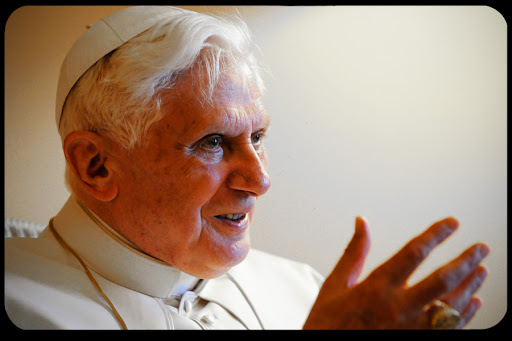Pope Francis commented recently on accusations of Marxism stemming from anti-market language employed in Evangelii Gaudium. Unfortunately overshadowed by his new status as TIME’s Person of the Year (apparently one of the few things that trumps a papal interview these days), the remarks are concise and support the reading of EG offered here, here, and here.
When asked about criticism by “ultraconservatives in the USA” who called him a Marxist, Francis replied:
"[. . .] There is nothing in the Exhortation that cannot be found in the social Doctrine of the Church. I wasn’t speaking from a technical point of view, what I was trying to do was to give a picture of what is going on. The only specific quote I used was the one regarding the “trickle-down theories” which assume that economic growth, encouraged by a free market, will inevitably succeed in bringing about greater justice and social inclusiveness in the world. The promise was that when the glass was full, it would overflow, benefitting the poor. But what happens instead, is that when the glass is full, it magically gets bigger [sic] nothing ever comes out for the poor. This was the only reference to a specific theory. I was not, I repeat, speaking from a technical point of view but according to the Church’s social doctrine. This does not mean being a Marxist."
Also overlooked amidst the fallout from Evangelii Gaudium was a statement by Pope Emeritus Benedict XVI, which defended not only Francis’s remarks in EG, but also their specific context, as as well as the greater role of the Church vis-à-vis economics and morality. In his own release, Benedict wrote:
"Let me clarify somewhat the exact point in question. At first glance, precisely in terms of classical economic theory, it is not obvious what the Church and the economy should actually have to do with one another, aside from the fact that the Church owns businesses and so is a factor in the market. The Church should not enter into dialogue here as a mere component in the economy, but rather in its own right as Church."
Benedict went on to castigate Smithian economics, in particular—a system where “voluntary ‘moral’ actions contradict market rules and drive the moralizing entrepreneur out of the game”—as a culprit against which the Church must align:
As Francis remarked, however, “Marxist ideology is wrong,” too. And Benedict pulled no punches in backing this claim, as well.
Keep reading on the next page
It’s apparent, here, that Benedict was referring, at least in part, to claims made in paragraph 57 of Evangelii Gaudium, which reads:
"Behind [the thirst for power and possessions] lurks a rejection of ethics and a rejection of God. Ethics has come to be viewed with a certain scornful derision. It is seen as counterproductive, too human, because it makes money and power relative. It is felt to be a threat, since it condemns the manipulation and debasement of the person. In effect, ethics leads to a God who calls for a committed response which is outside the categories of the marketplace. When these latter are absolutized, God can only be seen as uncontrollable, unmanageable, even dangerous, since he calls human beings to their full realization and to freedom from all forms of enslavement."
Driving home his defense—and frankly, his more pointed rendition—of Francis’s economic critiques in EG, Benedict noted:
"It is becoming an increasingly obvious fact of economic history that the development of economic systems which concentrate on the common good depends on a determinate ethical system, which in turn can be born and sustained only by strong religious convictions. Conversely, it has also become obvious that the decline of such discipline can actually cause the laws of the market to collapse. An economic policy that is ordered not only to the good of the group – indeed, not only to the common good of a determinate state – but to the common good of the family of man demands a maximum of ethical discipline and thus a maximum of religious strength. The political formation of a will that employs the inherent economic laws towards this goal appears, in spite of all humanitarian protestations, almost impossible today. It can only be realized if new ethical powers are completely set free. A morality that believes itself able to dispense with the technical knowledge of economic laws is not morality but moralism. As such it is the antithesis of morality. A scientific approach that believes itself capable of managing without an ethos misunderstands the reality of man. Therefore it is not scientific. Today we need a maximum of specialized economic understanding, but also a maximum of ethos so that specialized economic understanding may enter the service of the right goals. Only in this way will its knowledge be both politically practicable and socially tolerable."
As unprecedented as such a lengthy defense of a reigning pope by a former pope may be, probably the most uncanny feature is the exact timing of Benedict’s statement, which came in November of 1985—nearly thirty years before the publication of Evangelii Gaudium.

